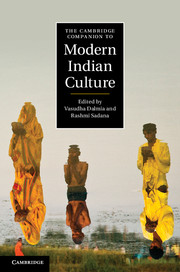Book contents
- Frontmatter
- Introduction
- Part I Cultural contexts
- Part II Cultural forms
- 6 The Bengali novel
- 7 Writing in English
- 8 Dalit life stories
- 9 National tradition and modernist art
- 10 Mass reproduction and the art of the bazaar
- 11 Urban theatre and the turn towards ‘folk’
- 12 Aesthetics and politics in popular cinema
- 13 Musical genres and national identity
- 14 Voyeurism and the family on television
- Further reading
- Index
- Cambridge Companions to Culture
7 - Writing in English
from Part II - Cultural forms
Published online by Cambridge University Press: 28 May 2012
- Frontmatter
- Introduction
- Part I Cultural contexts
- Part II Cultural forms
- 6 The Bengali novel
- 7 Writing in English
- 8 Dalit life stories
- 9 National tradition and modernist art
- 10 Mass reproduction and the art of the bazaar
- 11 Urban theatre and the turn towards ‘folk’
- 12 Aesthetics and politics in popular cinema
- 13 Musical genres and national identity
- 14 Voyeurism and the family on television
- Further reading
- Index
- Cambridge Companions to Culture
Summary
R. K. Narayan (1906–2001), the great stalwart of Indian English fiction, wrote over a dozen novels set in the mytho-poetic town of Malgudi; one of them, The Vendor of Sweets (1967), is a prescient parable for Indian writing in English. The novel is about the generation gap between a father and son, one that hinges on the differences of living in a new way as opposed to a more established one. Narayan's works are known for their subtle humour, and in this novel, it comes in the form of a story-writing machine that a young man, Mali, brings back to India after having gone to America to study creative writing. Before Mali leaves for America, his father, Jagan, questions why he has to go there to learn the art of fiction in the first place. Jagan complains to a sympathetic cousin: ‘Going there to learn storytelling! He should rather go to a village granny’; and then he asks, ‘Did Valmiki go to America or Germany in order to learn to write his Ramayana?’
Here, Narayan captures the tension between two sorts of fabrications – modernity and tradition – as he invariably pits the allure of the foreign against seemingly stable home truths. But this easy East–West opposition gets much more interesting and funnier when Mali returns to Malgudi not as a writer, but as a businessman looking for investors to produce and sell an indigenous version of an American storytelling machine.
- Type
- Chapter
- Information
- The Cambridge Companion to Modern Indian Culture , pp. 124 - 141Publisher: Cambridge University PressPrint publication year: 2012
- 5
- Cited by



